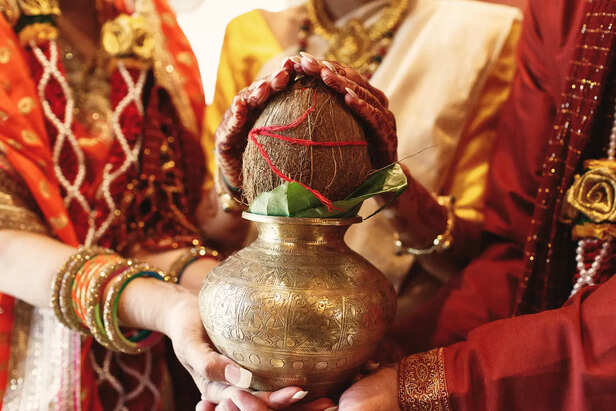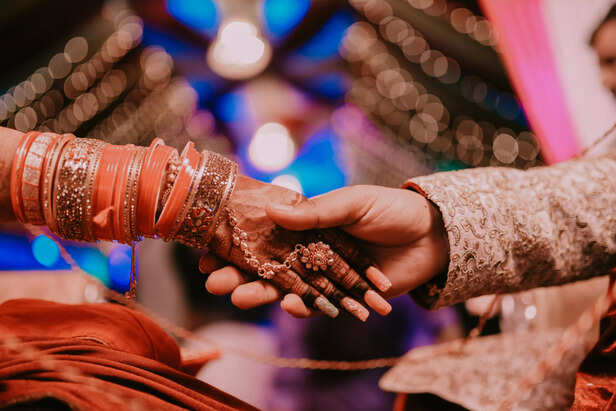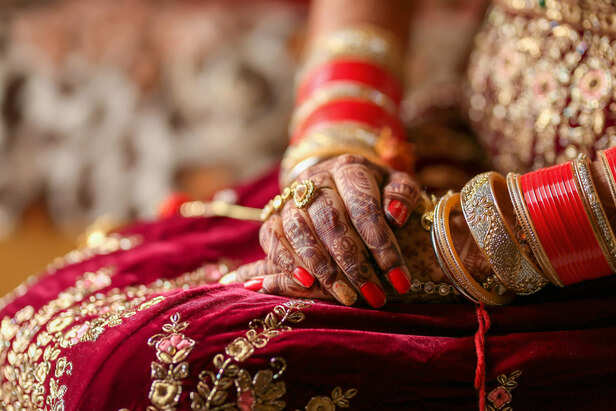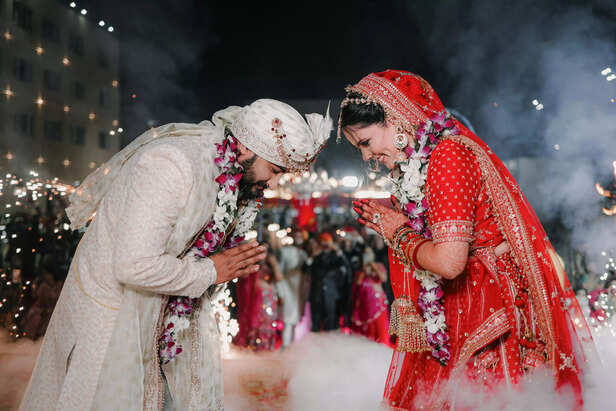Are Indian Marriages Built to Last? The Tough Truth Behind Tradition
Nikita Kanyal | Jan 07, 2025, 23:19 IST
( Image credit : Timeslife )
Are Indian marriages enduring connections or delicate partnerships fracturing under contemporary strains? This insightful article investigates the conflict between tradition and self-identity, delving into the increase in divorce rates, shifting gender roles, and the challenge of harmonizing cultural legacy with individual contentment. Explore the difficult realities behind the customs and uncover what lies ahead for one of India's oldest institutions.
Indian marriages have long been celebrated for their grandeur, elaborate ceremonies, and deep-rooted customs. Yet, behind the veneer of these seemingly perfect unions lies a question that many hesitate to ask: Are these marriages truly structured for longevity, or are they sustained by societal expectations rather than genuine connections?
The Weight of Tradition

For centuries, Indian marriages have emphasized duty, family, and societal approval over love. Arranged marriages remain the dominant practice in many communities, with families playing a significant role in determining whom individuals marry. Although this system often ensures compatibility in terms of culture, religion, and social status, it may also inhibit individuality and personal choice.
Tradition often requires that couples remain together regardless of their circumstances. Divorce, while increasingly common, continues to be considered taboo in numerous areas of India. women, specifically, are frequently expected to endure challenging marriages in order to maintain family honor. This societal pressure to conform can result in relationships that endure but do not necessarily flourish.
The Myth of Forever

Indian weddings are frequently referred to as “a union of two families,” but what occurs when family dynamics conflict? Numerous couples discover themselves torn between satisfying their families and creating a life together. The outcome? A marriage that may appear stable from the outside yet is filled with unexpressed resentment and unfulfilled expectations.
Furthermore, the belief that “marriages are made in heaven” has idealized the notion of permanence, allowing little space for failure. This societal narrative compels couples to make their marriage succeed at any expense, often neglecting emotional wellness. It raises the question: Are these marriages genuinely designed to endure, or are they merely constructed to survive?
Modern Love vs. Traditional Expectations
As India evolves, so do its marriages. Increasingly, young individuals are opting for love marriages, living together prior to marriage, or even deciding against marriage entirely. These changes are putting pressure on the traditional structure, but they are also resulting in conflict.
For example, numerous modern couples find it difficult to reconcile progressive values with traditional demands. A wife may desire to advance her career, but her in-laws might insist she concentrate on domestic responsibilities. A husband may seek a partner who shares duties equally, yet he may encounter backlash for not being the primary breadwinner. These inconsistencies frequently generate stress, complicating the ability of marriages to endure the passage of time.
The Silent Struggles

One of the biggest issues in Indian marriages is the lack of open communication. Topics like sex, mental health, and personal aspirations are often considered taboo, leading to a disconnect between partners. Many couples suffer in silence, prioritizing appearances over addressing their problems. This silence can erode the foundation of a marriage, leaving both partners feeling isolated and unfulfilled.
Additionally, societal gender roles often place an unequal burden on women. From managing household responsibilities to adapting to a new family’s traditions, women are often expected to sacrifice more in a marriage. This imbalance can lead to resentment and dissatisfaction over time.
Can Indian Marriages Evolve?

Despite these challenges, there is hope for Indian marriages to evolve into healthier, more equitable partnerships. Here’s how:
Prioritizing Communication: Couples need to create safe spaces for honest conversations about their needs, fears, and expectations. Open dialogue can help bridge gaps and build stronger emotional connections.
Redefining Roles: Both partners must challenge traditional gender roles and strive for a partnership based on mutual respect and shared responsibilities.
Normalizing Therapy: Seeking professional help should not be stigmatized. Marriage counseling can provide couples with tools to navigate conflicts and strengthen their bond.
Celebrating Individuality: Marriages should allow room for personal growth and independence, ensuring that both partners can pursue their dreams without guilt or judgment.
Are Indian marriages built to last? The answer depends on whether they can adapt to the changing needs of modern relationships. While tradition provides a strong foundation, clinging to outdated norms can weaken the very bonds they’re meant to strengthen.
Indian marriages don’t have to be a choice between tradition and progress they can be a blend of both. By embracing communication, equality, and individuality, couples can create relationships that are not just enduring but truly fulfilling. The real question isn’t whether Indian marriages can last but whether they can thrive in today’s evolving world.
The Weight of Tradition

Endurance Over Happiness
( Image credit : Timeslife )
For centuries, Indian marriages have emphasized duty, family, and societal approval over love. Arranged marriages remain the dominant practice in many communities, with families playing a significant role in determining whom individuals marry. Although this system often ensures compatibility in terms of culture, religion, and social status, it may also inhibit individuality and personal choice.
Tradition often requires that couples remain together regardless of their circumstances. Divorce, while increasingly common, continues to be considered taboo in numerous areas of India. women, specifically, are frequently expected to endure challenging marriages in order to maintain family honor. This societal pressure to conform can result in relationships that endure but do not necessarily flourish.
The Myth of Forever

Are Indian Marriages Built to Thrive or Just to Survive
( Image credit : Timeslife )
Indian weddings are frequently referred to as “a union of two families,” but what occurs when family dynamics conflict? Numerous couples discover themselves torn between satisfying their families and creating a life together. The outcome? A marriage that may appear stable from the outside yet is filled with unexpressed resentment and unfulfilled expectations.
Furthermore, the belief that “marriages are made in heaven” has idealized the notion of permanence, allowing little space for failure. This societal narrative compels couples to make their marriage succeed at any expense, often neglecting emotional wellness. It raises the question: Are these marriages genuinely designed to endure, or are they merely constructed to survive?
Modern Love vs. Traditional Expectations
For example, numerous modern couples find it difficult to reconcile progressive values with traditional demands. A wife may desire to advance her career, but her in-laws might insist she concentrate on domestic responsibilities. A husband may seek a partner who shares duties equally, yet he may encounter backlash for not being the primary breadwinner. These inconsistencies frequently generate stress, complicating the ability of marriages to endure the passage of time.
The Silent Struggles

Communication and Equality Are Often Sacrificed in the Name of Tradition
( Image credit : Timeslife )
One of the biggest issues in Indian marriages is the lack of open communication. Topics like sex, mental health, and personal aspirations are often considered taboo, leading to a disconnect between partners. Many couples suffer in silence, prioritizing appearances over addressing their problems. This silence can erode the foundation of a marriage, leaving both partners feeling isolated and unfulfilled.
Additionally, societal gender roles often place an unequal burden on women. From managing household responsibilities to adapting to a new family’s traditions, women are often expected to sacrifice more in a marriage. This imbalance can lead to resentment and dissatisfaction over time.
Can Indian Marriages Evolve?

Embracing Open Communication, Equality, and Personal Growth for Lasting Fulfillment
( Image credit : Timeslife )
Despite these challenges, there is hope for Indian marriages to evolve into healthier, more equitable partnerships. Here’s how:
Prioritizing Communication: Couples need to create safe spaces for honest conversations about their needs, fears, and expectations. Open dialogue can help bridge gaps and build stronger emotional connections.
Redefining Roles: Both partners must challenge traditional gender roles and strive for a partnership based on mutual respect and shared responsibilities.
Normalizing Therapy: Seeking professional help should not be stigmatized. Marriage counseling can provide couples with tools to navigate conflicts and strengthen their bond.
Celebrating Individuality: Marriages should allow room for personal growth and independence, ensuring that both partners can pursue their dreams without guilt or judgment.
Are Indian marriages built to last? The answer depends on whether they can adapt to the changing needs of modern relationships. While tradition provides a strong foundation, clinging to outdated norms can weaken the very bonds they’re meant to strengthen.
Indian marriages don’t have to be a choice between tradition and progress they can be a blend of both. By embracing communication, equality, and individuality, couples can create relationships that are not just enduring but truly fulfilling. The real question isn’t whether Indian marriages can last but whether they can thrive in today’s evolving world.
